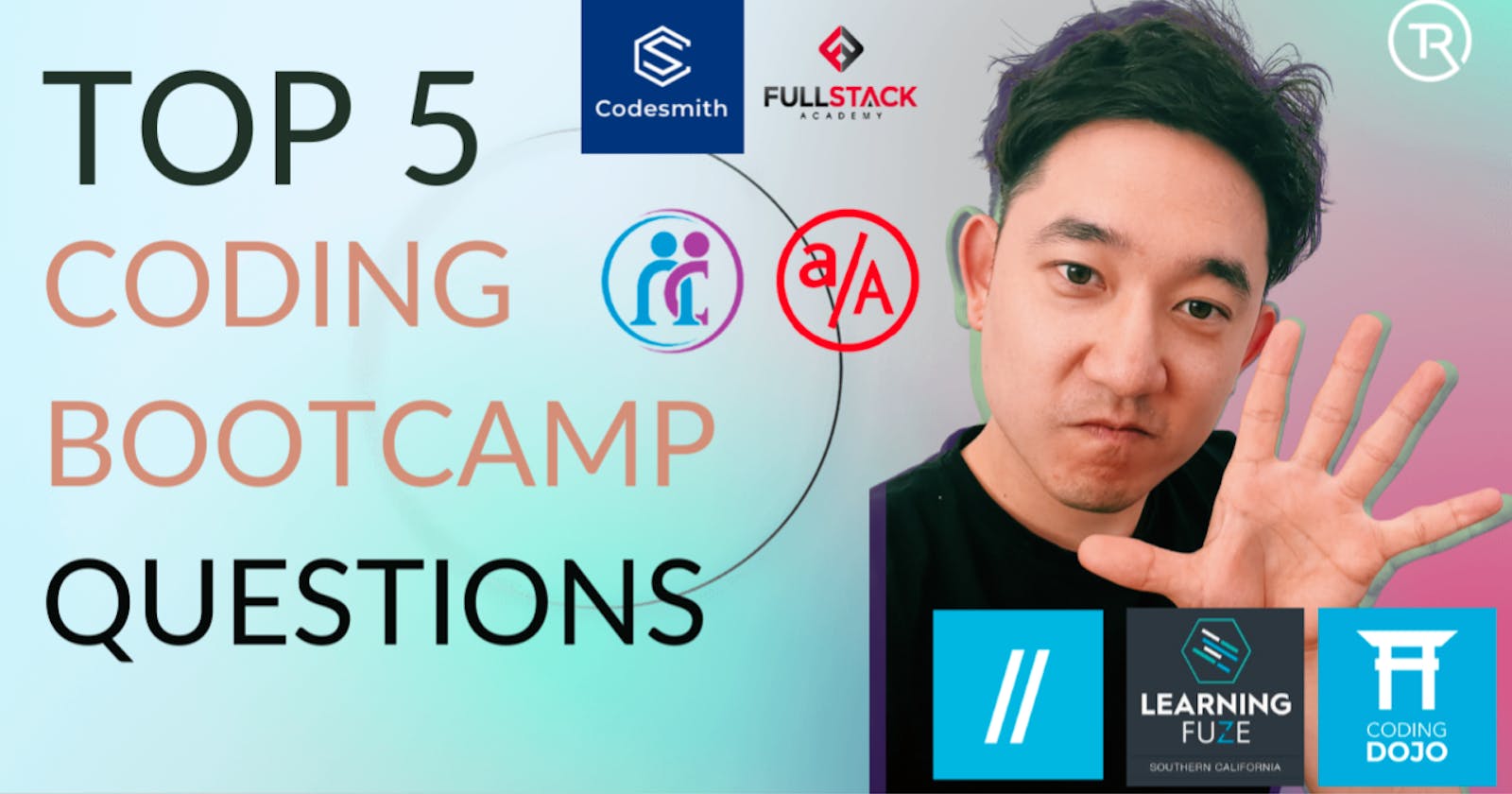Video format here
Today I am going to be talking about top questions you should ask before attending a coding bootcamp!
If you didn’t know coding bootcamps in general are very expensive. Don’t be like Fry and blindly pay without taking these questions into consideration.

Before you decide to fork up between $15,000-$30,000 to learn how to code, I really believe you as a customer should know what you’re getting yourself into. The last thing you want is to pay a large sum, finish the curriculum, and just end up in the same spot you came from.
So you might be asking yourself, what makes this guy qualified? Well funny enough, I also attended a coding bootcamp school back in 2015, I researched as much as I could, asked what I believe were the right questions, and made the leap to learn how to code.
I put top 5 questions to ask, but the truth is, you should be asking way more than that. Ultimately it’s up to you to leverage your resources by talking to people who graduated from the program and network, so at the end, you can feel confident that you made the right decision.
Question 1 — How is the coding bootcamp different from taking an online Udemy course?
Bootcamps are around 15 to 30 thousand dollars. Udemy courses during flash sales are around $10-$12. What if you sign up for a coding bootcamp and they tell you to use a Udemy course as a major part of your curriculum? What did you exactly pay for then? It’s mind boggling to hear some horror stories where coding bootcamps do not take the time to even create their own curriculum.
A lot of people say coding bootcamps are a waste of money and you can learn independently. Yes you can learn by yourself, but what coding bootcamps are supposed to provide is that secret recipe (their curriculum) to teach you how to code quickly. That goes off the rail if the coding bootcamp is strictly using Udemy courses.
Thats a big no-no.
In my opinion, it is okay to add Udemy courses as supplemental information but it should not be the bulk of the curriculum.
Question 2 — Who are my instructors and teacher assistants?**
A lot of coding bootcamps talk about having the best instructors in the business. What is that based off of? I’ve read enough stories on reddit about inexperienced teachers and teachers leaving before the curriculum is done because they’re overworked/overwhelmed.
You, as the student, should not pay that amount of money and have a horrible instructor or an instructor that’s really good just suddenly leaving. I highly encourage you to ask them how are teachers are assigned to a cohort. What is their professional experience as Software Engineers. How many years have they taught?
I would expand on the original question and ask what happens if an instructor decides to leave? Do I get a reduced cost on the bootcamp, how do you make sure I am in the best position to succeed if something like this happens?
It seems like a no brainer to have some insurance around this situation. You want to learn from the best people and that’s what you should expect when you pay the high price tag.
Question 3 — What happens if I fall behind? (Refund policy)
When I attended my coding bootcamp there was no real concept of failing. That’s what I loved about it. No grades, no pass or fail, I can just invest in actually learning. Once you start incorporating pass fail, which I heard a lot of coding bootcamps have started to do as they started taking on more students, it causes pressure to pass the module rather than truly understanding the concepts.
But I digress….
The important thing with this question is what exactly happens if I fall behind and can’t pass a module? How exactly does someone pass or fail? How do you prevent people from cheating? Do I get kicked out? If I do get kicked out, do I get a partial or full refund? What happens if I do an Income Share Agreement? Am I still on the hook for that?
You want to protect your asset as much as possible in case things go wrong. Even if its not in your favor, there is a lot of value of being aware of the risks that you’re taking.
So be aware, this is the important part here.
Question 4 — How many and what type of projects should I expect by the time I finish?
Coding bootcamps, fair or not, are supposed to get your job ready not just teach you how to code. If you want to be job ready you need to build meaningful projects. I would ask what kind of projects are your alumni students building and can I see them?
If the alumni projects aren’t available online and only on github that is a huge red flag. A project has to be accessible through a domain. That is the minimum requirement. Period. Recruiters are not going to pull your code down from github and test your stuff locally.
Specific to what type of projects, students should be trying to solve real world problems. Something like an invoice app, product feedback app, or a bug tracker are one of many examples that are complex enough to build and anyone would understand the use case for it.
This is a more of a personal bias, but I would prefer if the coding bootcamp gave a list of projects to build rather than a niche site by the student. As a new developer, you don’t really know what is considered a good project or not, in relation to helping you find a job. I would like to think a bootcamp has done enough research to figure out a way to
#1 — Challenge you to build a complex app to help you improve your coding skills
#2 — Build an app thats meaningful and solves a business problem
Question 5 — How will the coding bootcamp help me find a job?
This is the most important question to me. How is my coding bootcamp going to help me find a job? Am I just expected to apply on Linkedin and Glassdoor by myself? Do you have a career service team and if so, can you give me introductions? How are resources allocated for each student in respect to the job hunt?
I am aware some schools do career coaches but I heard very mixed reviews. If I was new joining a bootcamp, I would ask is that it? What else can you provide?
I do admit, these days it does feel like you need to be more proactive than reactive in your job hunt. However, I would still expect in 2021 and 2022, a coding bootcamp to at least have a career service team where you can talk to staff about your job hunt and ask for help.
Unfortunately, I heard some coding bootcamps just forget about you after you graduate, which is very wrong. Let’s avoid that if possible.
Again, fairly or unfairly, coding bootcamps and the price tag that comes with it, will be judged on well they can find you a job. This not only applies to teaching you how to code but diving deep into their career service team.
Conclusion
So that’s it! There are way more questions that you should definitely think about. I highly encourage you to view the coding bootcamp not as just as a school that teaches you how to code, but a school that will get you a job. Cater your questions around that and you’ll know exactly what to ask.
Another thing I didn’t add was read the contract, especially if you do an Income Share Agreement (ISA). It can be a blessing or the biggest mistake you ever made doing an ISA so understand the risks that are involved.
At the end of the day, If a coding bootcamp is being difficult or cant answer these type of question, then maybe you shouldn’t invest the 10s of the thousands dollars. I wish you the best of luck! Keep on coding developers!
Thank you and if you want more content like this here are my socials!
🖥 Frontend Developer Roadmap via techrally.co
📝 1:1 Paid Coaching: bit.ly/tr-coaching-yt
🗣 Discord: bit.ly/tr-discord-yt
🐦Twitter: twitter.com/TheTechRally
📷 Instagram: instagram.com/thetechrally
